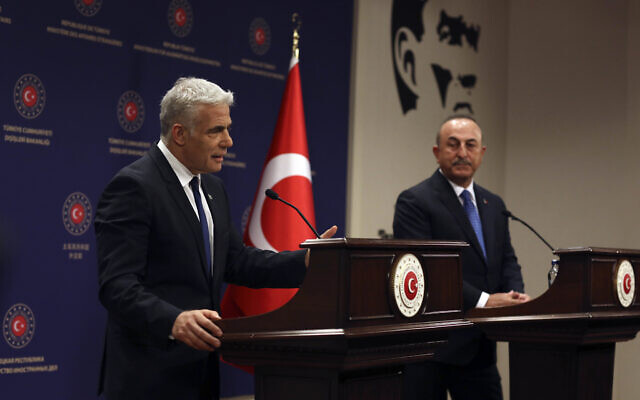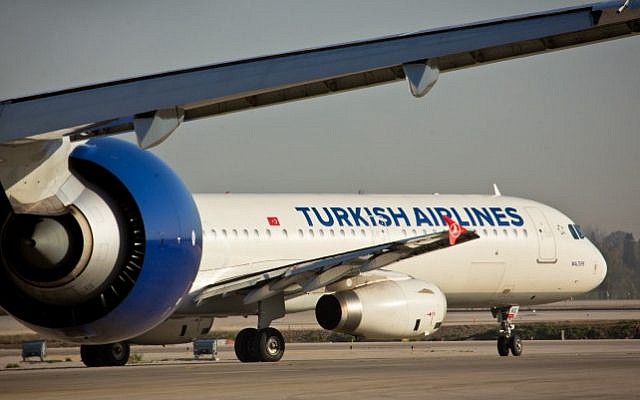Israel, Turkey sign updated aviation agreement as bilateral ties continue to improve
Israel and Turkey signed an outline of a civilian aviation agreement on Thursday, set to replace the current accord dating back to 1951.
Prime Minister Yair Lapid, who is still serving as foreign minister as well, and Turkish Foreign Minister Mevlut Cavusoglu agreed last month to work toward the new agreement in their recent meetings in Jerusalem and in Ankara as the two countries continue to move steadily toward restoring full diplomatic relations.
Irit Lillian, Israel’s charge d’affaires in Ankara, told The Times of Israel that Thursday’s announcement is a “first step” in the signing of the full aviation agreement.
“We have finished the round of talks between the two countries and between the two aviation authorities,” she said. “The two governments now have to finish the process according to their own procedures, then the document will be ready for the signature of the ministers and will go into effect.”
The outline agreement was signed by Joel Feldschuh, the Civil Aviation Authority director general, during a ceremony conducted by video conference.
Lillian stressed that Thursday’s signing was an important step “because it means that the agreement, in our eyes, is set.”

Turkish Foreign Minister Mevlut Cavusoglu, right, and Foreign Minister Yair Lapid speak to the media after their talks, in Ankara, Turkey, Thursday, June 23, 2022. (AP/Burhan Ozbilici)
The final agreement is expected to reflect changes in the aviation procedures, laws and technology, and also updates the number of flights allowed between the countries.
The finer details of the agreement now must pass through both countries’ internal approval processes, which could well be held up in Israel because of the current political situation.
At the same time, the agreement does not solve the dispute keeping Israeli carriers from flying to Turkey.
Israeli airlines have been unable to fly to any destination in Turkey since 2007, because Turkish authorities refused to cooperate with Israel’s special security requirements. This has allowed Turkish airlines to monopolize the lucrative route.
The Turks refused to allow Israeli security personnel “to perform the security checks on passengers boarding flights to Israel,” according to Flightglobal.com, a leading website covering the aviation and aerospace industries.

A Turkish Airlines flight seen at the airstrip at the Ben Gurion International Airport. February 26, 2015. (Moshe Shai/FLASH90)
The aviation authorities must meet again to work out those details, and Israel’s security agencies will have to review them as well.
The aviation agreement signed Thursday is not a precondition for the return of Israeli carriers to Turkey, but makes the work on finding a security agreement much easier, said Lillian.
The last time the two sides discussed a new civilian aviation agreement was in 2013, in the wake of a moderate improvement in relations, but those efforts failed.
For more than a decade, Turkey was one of Israel’s most bitter critics on the international stage. Anti-Israel rhetoric from top officials, led by President Recep Tayyip Erdogan, verged on the apoplectic. Ankara also took actions that angered officials in Jerusalem, most notably providing support and a haven for the Hamas terror group.
For the past two years, however, Erdogan has struck a noticeably different tone toward Israel, expressing interest in improving ties. Jerusalem and Ankara have been working to move beyond the crisis.

Turkish President Recep Tayyip Erdogan addresses a protest rally against Israel in Istanbul on May 18, 2018. (OZAN KOSE/AFP)
Both President Isaac Herzog and Lapid visited Turkey this year, and Israel’s senior leaders have spoken several times with Erdogan. The two sides are focused on signing a range of agreements as part of the upturn in bilateral ties.
Turkey recalled its ambassador and asked Israel’s to leave in May 2018, in the wake of violent protests on the Israel-Gaza border in which dozens of Palestinians were killed. Turkish and Israeli leaders criticized each other bitterly, with Erdogan calling Israel a “child-murdering” country and Netanyahu accusing Erdogan of killing Kurdish civilians.
A new rapprochement process has been underway since May 2020. That month, an El Al cargo plane landed in Turkey for the first time in a decade.
The aviation agreement “is an important milestone in the deepening and broadening of the relation between the countries,” said Lillian.



